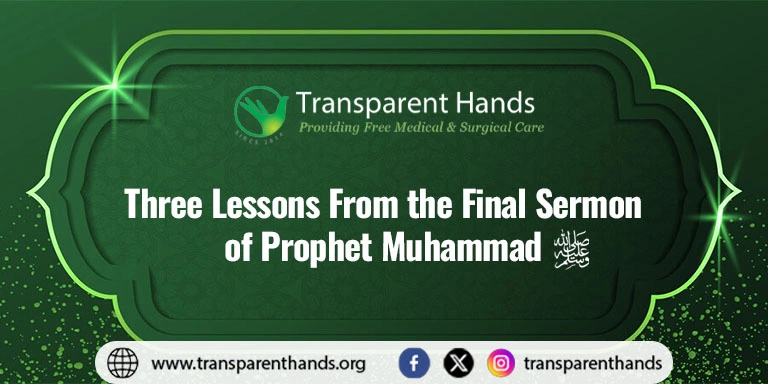Three Lessons From the Final Sermon of Prophet Muhammad ﷺ

On the ninth of Dhul Hijjah, 10 A.H. (623 AD), the Prophet Muhammad (ﷺ) addressed thousands of Muslims who had gathered at the Uranah valley of Mount Arafat in Mecca for the annual Hajj. This was the Prophet’s(ﷺ) last Hajj and his final major sermon. The occasion also marked the pinnacle of the Prophet’s (ﷺ) efforts as a leader, reformist, and the Messenger of Allah (ﷺ). It was during this sermon that the last Quranic verse was revealed.
“This day I have perfected for you your religion and completed My favor upon you and have approved for you Islam as religion.” (Surah Al-Ma’idah, 5:3).
The sermon has great significance in Islamic history and the power to inspire. The last sermon of Prophet Muhammad (ﷺ) carries many important lessons for Muslims and humanity in general. The sermon encompasses the essence of Islam’s message and carries several important themes that are still relevant for today’s world. In this article, we will explore three important themes from one of the Prophet’s (ﷺ) last sermons and see their relevance for Muslims in modern times.
Your Qurbani Donation will bring many smiles.
Respect for Each Other:
The Prophet (ﷺ) emphasized unity among Muslims and asked them to maintain respect for each other’s lives, properties, and honor. He also warned the Muslim community against violence and internal strife. The message is as relevant to Muslims today as it was for the nascent Muslim community of that time.
Narrated `Abdullah: Allah Apostle said in Hajjat-al-Wada`, “Which month (of the year) do you think is most sacred?” The people said, “This current month of ours (the month of Dhull-Hijja).” He said, “Which town (country) do you think is the most sacred?” They said, “This city of ours (Mecca).” He said, “Which day do you think is the most sacred?” The people said, “This day of ours.” He then said, “Allah, the Blessed, the Supreme, has made your blood, your property and your honor as sacred as this day of yours in this town of yours, in this month of yours (and such protection cannot be slighted) except rightfully.” He then said thrice, “Have I conveyed Allah’s Message (to you)?” The people answered him each time saying, ‘Yes.” The Prophet (ﷺ) added, ‘May Allah be merciful to you (or, woe on you)! Do not revert to disbelief after me by cutting the necks of each other.’ (Sahih al-Bukhari, 6785)
Emphasize on Unity:
A similar message is given in the Quran, in which Allah (SWT) urges Muslims to unite and practice gratitude:
“And hold firmly to the rope of Allah all together and do not become divided. And remember the favor of Allah upon you – when you were enemies and He brought your hearts together and you became, by His favor, brothers. And you were on the edge of a pit of the Fire, and He saved you from it. Thus does Allah make clear to you His verses that you may be guided.” (Surat ‘Āli `Imrān, 3:103)
Make Qurbani Donation to share Eid joys.
The Rights of Women:
The last sermon of the Prophet (ﷺ) ordains Muslim men to treat women with respect. He asked men to provide for the women and fulfill their needs. Moreover, He addressed women’s rights in marriage and encouraged men to treat them with dignity, kindness, and consideration. He clearly defined that husbands have limited authority over their wives and defined their rights over their wives, which involved upholding the sanctity of marriage.
The Messenger of Allah (ﷺ) said: “And indeed I order you to be good to the women, for they are but captives with you over whom you have no power than that, except if they come with manifest Fahishah (evil behavior). If they do that, then abandon their beds and beat them with a beating that is not harmful. And if they obey you then you have no cause against them. Indeed you have rights over your women, and your women have rights over you. As for your rights over your women, then they must not allow anyone whom you dislike to treat on your bedding (furniture), nor to admit anyone in your home that you dislike. And their rights over you are that you treat them well in clothing them and feeding them.” (Jami` at-Tirmidhi, 1163)
Abolishment of Old Customs:
Usury is an unfortunate practice that extracts excessive interest from loans. In the last sermon, the Prophet (ﷺ) categorically abolished the practice. He also abolished blood feuds and guided Muslims on a fresh new path.
“All the blood feuds of the Ignorance days are abolished, and the first of them that I abolish is the blood feud of Harith bin ‘Abdul-Muttalib, who was nursed among Banu Laith and killed by Hudhail. All the usuries of the Ignorance days are abolished, but you will have your capital. Do not wrong others and you will not be wronged. O my nation, have I conveyed (the message)?’ (He asked this) three times. They said: ‘Yes.’ He said: ‘O Allah, bear witness!’ three times.” (Sunan Ibn Majah, 3055)
About Transparent Hands:
Transparent Hands is one of the top Pakistani crowdfunding platforms dedicated to providing relief to the most deserving patients in the country. We understand that access to quality surgical and medical care is everyone’s birthright; however, many Pakistanis have little or no access to quality healthcare. We try to reach disadvantaged communities by arranging medical camps in low-income areas. Our medical camps offer free check-ups, diagnostic tests, and free medicines. We also arrange preventive healthcare sessions for the participants of the camps. Our online platforms are designed to inform donors about the progress of the patients they support. Transparent Hands also organizes Qurbani according to the Sharia rulings and distributes the sacrificial meat among the most underprivileged and vulnerable communities. Transparent Hands aims to reach out to many deserving individuals with your cooperation. Please donate now to ensure that your Qurbani goes to the ones who deserve it the most.
Conclusion:
The last sermon of the Prophet (ﷺ) carries many important messages for Muslims. The Prophet (ﷺ) urged Muslims to unite and let go of internal strife and hold sacred each other’s lives, dignity, and properties. He (ﷺ) also emphasizes being kind to women and asks husbands to fulfill the needs of their wives. Another important lesson from the last sermon of the Prophet (ﷺ) is about the abolishment of old customs such as blood feuds. In this article, we have discussed some of these teachings. As Muslims prepare for Eid al-Adha, they should reflect on the great teachings of Islam and follow the Sunnah of the Prophet (ﷺ) in their conduct. Sharing is a key Islamic value. This Eid al-Adha, Transparent Hands plans to reach vulnerable communities with your Qurbani donations. Donate to Transparent Hands now.











Leave Your Comments